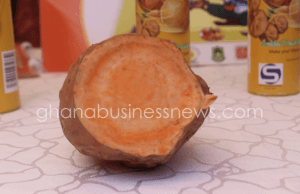Ghanaians urged to cultivate of Orange Flesh Sweet Potatoes
 Ghana, a Non Governmental Organization promoting sustainable Agriculture in Northern Ghana has called on municipal and district assemblies to assist farmers in the region to cultivate the Orange Flesh Sweet Potatoes (OFSP).
Ghana, a Non Governmental Organization promoting sustainable Agriculture in Northern Ghana has called on municipal and district assemblies to assist farmers in the region to cultivate the Orange Flesh Sweet Potatoes (OFSP).
Mr Vincent Subbey, Director of Trax Ghana, said such assistance when given on time would help the farmers achieve good yields.
He said this at a recent conference held on the theme: “Promoting Orange Flesh Sweet Potato for food security, health and income.
The event brought together farmers and other stakeholders to deliberate on ways to promote Orange Flesh Sweet Potatoes (OFSP).
He said his outfit was also soliciting for other interventions to assist farmers with irrigation services during the dry season.
Dr Francis Kwaku Amagloh, Lecturer at the University of Development Studies and Mr Kwabena Acheremu of the Centre for Scientific and Industrial Research / Savanna Agriculture and Research Institute (CSIR-SARI ) in their presentations reiterated the need to adopt and utilize the OFSP in the three regions of the north.
They said this was important as the potato variety was renowned for its nutritious and economic advantages.
Mr Acheremu said the crop was also noted for its richness in Vitamin A and other medicinal uses and called for the crop to be produced on large scale by farmers to create alternative source of income and livelihood for farmers and their families.
Trax Ghana is supported by its donor, Self Help Africa (SHA) with technical support from International Potato Centre (IPC) and Savannah Agricultural Research Institute (SARI) to promote resilient nutritious Orange-Fleshed Sweet potato (OFSP) to improve household food security, diet and income.
The organization has been working with smallholder farmers in northern Ghana for the past 26 years in sustainable agriculture to enhance food security and environmental restoration.
The OFSP was introduced on a pilot basis to 50 farmers in the Pelungu community in 2013 and this was scaled up in 2014 to 100 farmers around Pelungu and Kabusgo communities.
Trax Ghana is currently promoting the crop among 1,200 farmers in the Nabdam and Bongo districts.
Source: GNA
